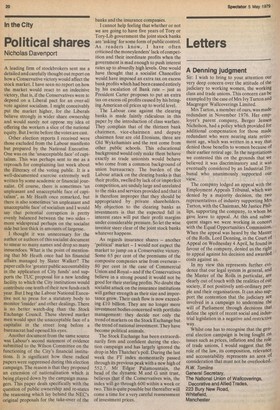In the City
Political shares
Nicholas Davenport
A leading firm of stockbrokers sent me a detailed and carefully thought out report on how a Conservative victory would affect the stock market. I have seen no report on how the market would react to an indecisive victory, that is, if the Conservatives were tc depend on a Liberal pact for an over-all vote against socialism. I might conceivably put the market higher, for the Liberals believe strongly in wider share ownership and would surely not oppose my idea of offering the workers a slice of the national equity. But I write before the votes are cast.
Other election reports I received were those excluded from the Labour manifesto but prepared by the National Executive. One was on the 'unacceptable face' of capitalism. This was perhaps sent to me as a reproach for complaining last week about the illiteracy of the voting public. It is a well-documented exercise extremely well written by some academic or financial journalist. Of course, there is sometimes 'an unpleasant and unacceptable face of capitalism', as Mr Heath once remarked, but there is also sometimes 'an unpleasant and unacceptable face' of socialism and I would say that potential corruption is pretty evenly balanced between the two sides — more widespread perhaps on the socialist side but less thick in amounts of largesse.
I thought it was unnecessary for the author or authors of this socialist document to smear so many names and drop so many innuendoes. What is the point of mentioning that Mr Heath once had his financial affairs managed by Slater Walker? The paper calls for 'greater public accountability in the application of City funds' and supports the TUC proposal for a new lending facility to which the City institutions would contribute one tenth of their new funds each year. But I beg the Labour National Executive not to press for a statutory body to monitor 'insider' and other dealings. There is no better watch-dog than the Stock Exchange Council. These shrewd market men would spot the unacceptable face of a capitalist in the street long before a bureaucrat had opened his eyes.
Another document from the same source was Labour's second statement of evidence submitted to the Wilson Committee on the functioning of the City's financial institutions. It is significant how these radical papers were suppressed during this election campaign. The reason is that they proposed an extension of nationalisation which is being played down by the campaign managers. This paper deals specifically with the question of public ownership and re-states the reasoning which lay behind the NEC's original proposals for the take-over of the banks and the insurance companies.
I cannot help feeling that whether or not we are going to have five years of Tory or Tory-Lib government the joint stock banks are 'asking' for some form of public control. As readers know, I have often criticised the moneylenders' lack of competition and their inordinate profits when the government is mad enough to push interest rates up to absurdly high levels. One would have thought that a socialist Chancellor would have imposed an extra tax on excess bank profits which had been caused entirely by his escalation of Bank rate — just as President Carter proposes to put an extra tax on excess oil profits caused by his bringing American oil prices up to world level.
The Labour case against the clearing banks is made faintly ridiculous in this paper by the introduction of class warfare. They complain that of the thirteen bank chairmen, vice-chairmen and deputy chairmen four are old Etonians, three are Old Wykehamists and the rest come from other public schools. This educational background would only make them behave exactly as trade unionists would behave who come from a common background of union bureaucracy. The burden of the Labour attack on the clearing banks is that their profits, swelled by lack of or imperfect competition, are unduly large and unrelated to the risks and services provided and that it is therefore improper that they should be appropriated by private shareholders. My objection to the clearing banks as investments is that the expected fall in interest rates will put their profit margins under considerable pressure. So let the wise investor steer clear of the joint stock banks whatever happens.
As regards insurance shares — another 'political' market — I would not expect the market to jump on a Conservative victory. Some 65 per cent of the premiums of the composite companies arise from overseas — 80 per cent in the case of Commercial Union and Royal — and if the Conservatives believe in a strong pound it would not be good for their sterling profits. No doubt the socialist attack on the insurance institutions will gather strength as their size and importance grow. Their cash flow is now exceeding LI 0 billion. They are no longer mere investment bodies concerned with portfolio management: they decide not only the trend of markets on the Stock Exchange but the trend of national investment. They have become political animals.
The Stock Exchange has been extraordinarily firm and confident during the election campaign and has largely ignored the drop in Mrs Thatcher's poll. During the last week the FT index momentarily passed through its previous peak with a new high of 552.7. Mr Edgar Palamountain, the head of the dynamic M and G unit trust, believes that if the Conservatives win, the index will go through 600 within a week or two. This is quite possible but thereafter will come a time for a very careful reassessment of investment prices.










































 Previous page
Previous page